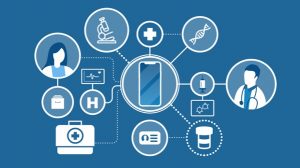What to Expect From Mobile Technology in 2021
In the digital era, everything important happens on a smartphone or tablet. Lives are connected in virtual format, in an on-demand, 24/7 buy-today-get-it-tomorrow hustle. This level of speed and need also extends to healthcare and the industry is racing to meet the need with new investments in mobile capabilities.  As the use of digital health tools soared due to the pandemic, the speed of development in mobile technology isn’t hitting the breaks. Below are some predictions of what’s to come in 2021:
As the use of digital health tools soared due to the pandemic, the speed of development in mobile technology isn’t hitting the breaks. Below are some predictions of what’s to come in 2021:
Predictive and personalized
Healthcare is one of the most personal industries, and mobile technology is moving to create a more personalized and tailored experience that is curated to patients’ specific challenges, needs and environment. Patients have higher expectations when it comes to the quality, safety and effectiveness of digital health solutions, and making the experience more personalized is a solid way to gain user trust.
Digital health solutions are moving to create a more proactive patient journey along the whole continuum of health, shifting from reactive care to be more predictive and prescriptive. This evolution comes as digital health platforms include evidence-based therapeutic interventions to prevent, manage and treat both medical and mental health conditions. Digital mobile technology is becoming more refined to create personalized services for different user groups like adolescents, women, seniors, people with chronic conditions.
Increased connectivity
For mobile technology to be effective, it must be able to connect users with services regardless of position. This requires greater investment in interoperability. As more patients flock toward digital health tools, systems are increasing capabilities into interoperability. 2021 is the year for greater data analytics, better visibility across EHR systems and the need to make population level decisions.
Real world needs, such as the visibility of vaccination status is likely to be a key driver. Adding to this demand is the increased acceptance of telehealth visits, virtual care, and the use of wearables to track patient health. Health tech companies are seeking ways to capture all of this important data and create a more complete view of individuals’ health. Through advancements in interoperability and connectivity, all of these elements can be captured through a smartphone that is essential to patients’ lives.
Health at home
The pandemic set into motion an accelerated acceptance of telehealth and virtual care. Patients were now able to connect to their health and healthcare providers via mobile technology, with 75% of patients saying they would continue course even after the pandemic. This change in attitudes has mobile tech companies clamoring to bring more of the healthcare experience into the home.
Companies such as Amazon, Apple, and Google are exploring ways to bring more of the healthcare experience into the home via integration with mobile technology and personal assistant tools like the Echo and Google Home. And tech companies are also helping major health systems, payers, and employers transform traditional delivery by integrating virtual care into the ecosystem. Health systems are already exploring long-term use of telemedicine and remote monitoring to increase connectivity to patients, thanks to increased confidence amongst patients and clinicians, better interfaces and improved reliability.
Views into vaccines
Mobile technology is supporting the development, distribution, and access to COVID-19 vaccines. New digital health tools are being used to check for early signs of viruses and are able to track outbreaks and vaccine availability by smartphone GPS locations. Vaccine status and health precautions will be essential in an effort to return to normal, and mobile technology is ramping up to support the effort.
There is mounting pressure to create a digital bio-passport for vaccines, aligned with global. Health tech companies are already exploring the use of a combined bio-passport and tracing app. Expect to see such a solution in the latter half of 2021, given the overall support from commercial players in the travel and hospitality industries desperate for any solution that could enable them to reopen their businesses.
Artificial Intelligence
Artificial intelligence (AI) is more than just a digital transformation trend in healthcare. AI represents the epitome of medical innovation and digital health players are eager to invest millions in it. The healthcare AI-powered tools market is expected to exceed $34 billion by 2025, which means this technology will shape almost all facets of the industry.
The use of AI is central to creating a personalized and predictive patient experience, as referenced earlier. AI is able to analyze thousands of patient-provided data points to deliver custom, tailored support and guidance toward better outcomes. Top pharmaceutical and biotechnology companies are using machine learning algorithms to shorten the drug development cycle.
In fact, recent findings show that AI can slash early drug discovery timelines by four years against the industry average and generate cost savings of 60 percent. Bringing that capability to mobile devices will help to reduce lag times, accelerate patient adoption, and create a more engaging experience.
While 2020 may have been the year of the pandemic, mobile technology did not slow down, and more health tech companies were innovating and advancing digital health solutions. Moving further into 2021, patients, providers, payers, and health systems are all set to gain from new innovations in mobile technology that reimagines the patient healthcare experience. The future is on-demand, streaming direct to mobile devices, and able to connect patients to all aspects of their health with the push of a button.
